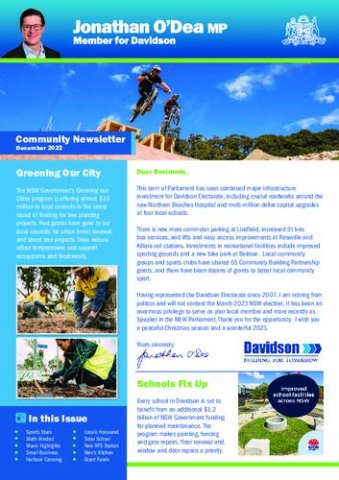Member for Davidson, Jonathan O’Dea, today announced four local schools have been successful in getting one of the NSW Government’s inaugural Sustainable Schools Grants.
Mr O’Dea said he was excited that Belrose Primary, Davidson and St Ives High Schools and Lindfield Learning Village all received grants in the new student-led program that’s focused on improving the environment at schools.
“I am thrilled that four of my local schools have been successful with their grant applications,” Mr O’Dea said.
“The Sustainable Schools Grants will empower students and school communities to implement projects that will benefit the environment by helping to save energy or water, reduce waste, or improve biodiversity.”
“I look forward to seeing the recycling projects, new gardens and the bamboo ‘bee hotels’ come to life in the coming months” he said.
The Sustainable Schools Grants program provides a total of $10 million over four years. It is open to all NSW public schools and preschools, with the next application round open in November.
Sustainable Schools Grants in the Davidson electorate are as follows:
Belrose Primary School, $10,476 for a Waste reduction campaign.
Davidson High School, $12,326 for a Waste, litter and kitchen garden project.
Lindfield Learning Village, $15,000 for a Sustainable garden.
St Ives High, $11,600 for a Vertical self-watering garden and bee habitat.
PROJECT DETAIL Belrose Public School Primary $10,476 for a School Waste Reduction Campaign. Our school alone contributes over 1200 bags of rubbish into landfill each year and our aim is to significantly reduce this by implementing a full Waste Reduction program across the school. This program would include: Co-Mingling Recycling, Soft plastic recycling with RED, Food waste composting, further paper recycling, general waste audits; Educating parents, students, teachers, canteen and office staff on reducing waste, Improved product / less plastics sold and less waste in the canteen.
Davidson High School $12,326 for recycling revitalisation. The school will undertake a litter audit to understand how much waste the school produces. The school will then undertake a focused plan to recycle. This will include; a review of the type and location of bins to separate out the types of litter, a composting system that returns the organic material to the gardens, taking part in the Return and Earn program, organising soft plastics to be collected and recycled separately and expanding the school’s battery and e-waste collection points.
Lindfield Learning Village $15,000 for integrated sustainability. The LLV Sustainable Garden project creates an outdoor learning space containing wicking beds and an aquaponics system to support students learning water efficient ways to grow food in an urban environment and observe the nitrogen cycle at work. The various animal and insect homes in the design will develop student’s understanding of biodiversity and ecosystem interdependence and build their responsibility to care for the environment. The composting systems included develop understanding and skills in sustainability and recycling. The native bush tucker plants will support understandings of Indigenous knowledge.
St Ives High School $11,600.00 for water, biodiversity project, Vertical Self-Watering Garden and Bee Habitat. Students have designed, and will construct, vertical gardens to supply organic ingredients including vegetables and herbs to the school’s hospitality centre. The gardens will be attached to the north/eastern wall of an existing school building. A bee habitat will be made to pollinate the local flora and increase bee numbers in the area. They will incorporate, water efficient design features to prevent water wastage during watering. A compositing box and/or worm farm below the garden beds to maximise the beneficial reuse of food waste. Flowering plants to attract foraging bees. Bee habitat features such as bamboo bee hotels



